
Convolvulaceae, commonly called the bindweeds or morning glories, is a family of about 60 genera and more than 1,650 species. These species are primarily herbaceous vines, but also include trees, shrubs and herbs. The tubers of several species are edible, the best known of which is the sweet potato.

Argyreia is a genus of plants in the family Convolvulaceae.

Manilkara is a genus of trees in the family Sapotaceae. They are widespread in tropical and semitropical locations, in Africa, Madagascar, Asia, Australia, and Latin America, as well as various islands in the Pacific and in the Caribbean. A close relative is the genus Pouteria.

Sterculia is a genus of flowering plants in the mallow family, Malvaceae: subfamily Sterculioideae. Members of the genus are colloquially known as tropical chestnuts. Sterculia may be monoecious or dioecious, and its flowers unisexual or bisexual.
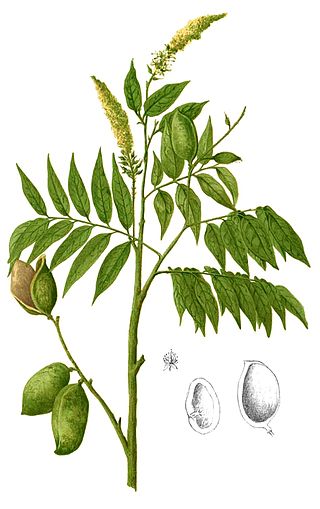
Crudia is a genus of plants in the family Fabaceae.

Macrolobium is a legume genus in the subfamily Detarioideae. It is a tropical genus with about 80 species. Half occur in Brazil, where they are common in the floodplains of the Amazonian Basin. Members of the genus are used as ornamentals and for their wood.

Ormosia is a genus of legumes. 131 living species, mostly trees or large shrubs, are native to the tropical Americas, from southwestern Mexico to Bolivia and southern Brazil, to southern, southeastern, and eastern Asia, and to New Guinea and Queensland. Most are tropical, while some extend into temperate temperate regions of China. A few species are threatened by habitat destruction, while the Hainan ormosia is probably extinct already.
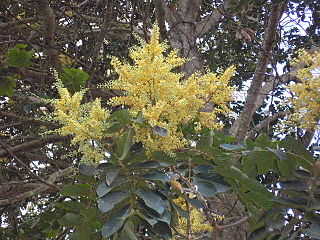
Tachigali is a flowering plant genus in the legume family (Fabaceae). It includes 74 species of trees native to the tropical Americas, ranging from Nicaragua to Bolivia, Paraguay, and southern Brazil. Typical habitats include tropical rain forest, lower montane forest, seasonally-flooded and non-flooded evergreen lowland forest and woodland, gallery and riparian forest, sometimes on white sands, cerrado and other dry woodland, and rocky grassland.

Bonamia is a genus of the flowering plant family Convolvulaceae, commonly known as the bindweed family and named after the French physician and botanist François Bonamy (1710-1786). Members of the genus are commonly known as the lady's nightcap.
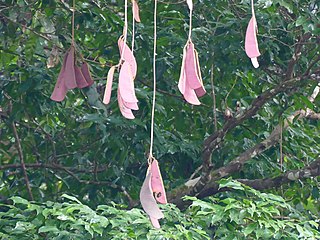
Eperua is a genus of flowering plants in the legume family, Fabaceae. It belongs to subfamily Detarioideae. It includes 16 species native to northern South America, in Colombia, Venezuela, the Guianas, and northern Brazil. They live in the jungles, often along rivers or streams. The leaves are compound pinnate, with smooth margins, and the fruits are long pods. The wood of E. falcata is called wallaba and is often used in construction.
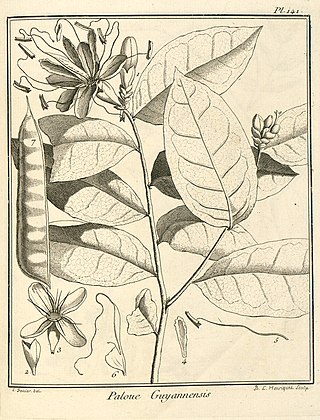
Paloue is a genus of flowering plants in the family Fabaceae. It belongs to the subfamily Detarioideae. The genera was first created with the description of Paloue guianensis by Aublet in 1775.
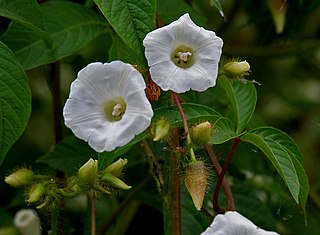
Merremia is a genus of flowering plants in the morning glory family, Convolvulaceae. Members of the genus are commonly known as woodroses.

Schnella is a genus of flowering plants in the legume family, Fabaceae. It belongs to the subfamily Cercidoideae. All of its species are neotropical lianas.
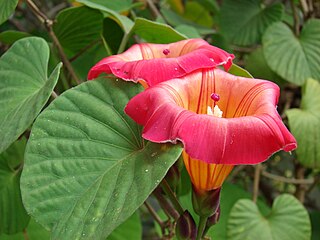
Stictocardia is a genus of flowering plants belonging to the family Convolvulaceae.
Dicranostyles is a genus of flowering plants belonging to the family Convolvulaceae.
Moquilea is a genus of flowering plants belonging to the family Chrysobalanaceae.

Zanthoxyloideae is a subfamily of the family Rutaceae.















